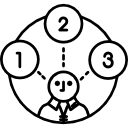Programming: Difference between revisions
Mr. MacKenty (talk | contribs) |
Mr. MacKenty (talk | contribs) |
||
| Line 20: | Line 20: | ||
* [[Control flow]] | * [[Control flow]] | ||
== | == Basic understanding == | ||
* [[Variables]] | * [[Variables]] | ||
* [[Constants]] | * [[Constants]] | ||
== Basic (primitive) Data types == | |||
* [[Objects]] | * [[Objects]] | ||
* [[ | * [[Boolean]] | ||
* [[Int]] | |||
* [[Float]] | |||
* [[Char]] | |||
* [[String]] | |||
== Common Data structures == | |||
* [[Arrays]] | |||
* [[Collections]] | |||
== Control == | |||
* [[Conditionals]] | * [[Conditionals]] | ||
** [[Operators]] | |||
* [[Loops]] | |||
== Basic program organization == | |||
* [[Algorithms]] | * [[Algorithms]] | ||
* [[Functions]] | * [[Functions]] | ||
== Other important ideas in programming == | == Other important ideas in programming == | ||
Revision as of 12:20, 20 July 2017
This is one of the most important ideas you can remember:
Decompose a problem into smaller parts, model a problem with flowcharts. Learn to think sequentially

Programming[1]
Programming is the issuing of instructions to a computer. You must learn how to issue instructions to a computer.
Introduction to programming[edit]
- What is a programming language?
- High level languages
- Compiler
- Low level languages
- Translating high-level code to low-level code
- Control flow